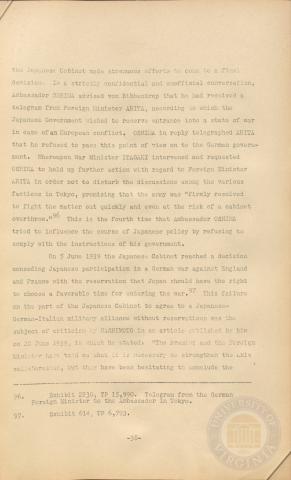
Page 38
| Parent | Japanese - German - Italian Collaboration |
|---|---|
| Date | |
| Language | English |
| Collection | Tavenner Papers & IMTFE Official Records |
| Box | Box 14 |
| Folder | Japan, Germany, Italy Collaboration and Introduction |
| Repository | University of Virginia Law Library |
the Japanese Cabinet made strenuous efforts to come to a fina.'J decision* In a strictly confidential and unofficial conversation, Ambassador OSHIMA advised von Ribbentrop that he had received a telegram from Foreign Minister ARITA, according to which the Japanese Government wished to reserve entrance into a state of war in case of an European conflict, OSHIMA in reply telegraphed ARITA that he refused to pass 'this point of view on to the German govern¬ment. Whereupon War Minister ITAGAKI intervened and requested OSHIMA to hold up further action with regard to Foreign Minister ARITA in order not to disturb the discussions among the various factions in Tokyo, promising that the army was "firmly resolved
to fight the matter out quickly and even at the risk of a cabinet
overthrow."96 This is the fourth time that Ambassador OSHIMA tried to influence the course of Japanese policy by refusing to comply with the instructions of his government.
On 5 June 1939 the Japanese Cabinet reached a decision conceding Japanese participation in a German war against England and France with the reservation that Japan should have the right to choose a favorable time for entering the war. 97 This failure on the part of the Japanese Cabinet to agree to a Japanese- German-Italian military alliance without reservations was the subject of criticism by HASHIMOTO in an articl.e published by him on 20 June 1939? in which he 'stated$ i!The Premier and the Foreign Minister have told us that it is necessary to strengthen the Axis collaboration, but they have been hesitating to conclude the
96.Exhibit 2230, TP 15,990. Telegram from the German Foreign Minister to the Ambassador in Tokyo.
97.Exhibit 614, TP 6,793.
